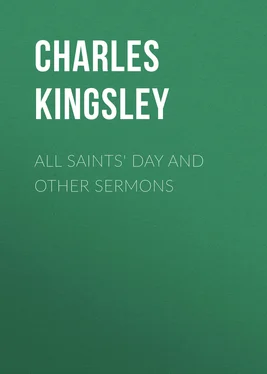Charles Kingsley - All Saints' Day and Other Sermons
Здесь есть возможность читать онлайн «Charles Kingsley - All Saints' Day and Other Sermons» — ознакомительный отрывок электронной книги совершенно бесплатно, а после прочтения отрывка купить полную версию. В некоторых случаях можно слушать аудио, скачать через торрент в формате fb2 и присутствует краткое содержание. Издательство: Иностранный паблик, Жанр: foreign_prose, foreign_religion, Философия, foreign_psychology, foreign_antique, на английском языке. Описание произведения, (предисловие) а так же отзывы посетителей доступны на портале библиотеки ЛибКат.
- Название:All Saints' Day and Other Sermons
- Автор:
- Издательство:Иностранный паблик
- Жанр:
- Год:неизвестен
- ISBN:нет данных
- Рейтинг книги:4 / 5. Голосов: 1
-
Избранное:Добавить в избранное
- Отзывы:
-
Ваша оценка:
- 80
- 1
- 2
- 3
- 4
- 5
All Saints' Day and Other Sermons: краткое содержание, описание и аннотация
Предлагаем к чтению аннотацию, описание, краткое содержание или предисловие (зависит от того, что написал сам автор книги «All Saints' Day and Other Sermons»). Если вы не нашли необходимую информацию о книге — напишите в комментариях, мы постараемся отыскать её.
All Saints' Day and Other Sermons — читать онлайн ознакомительный отрывок
Ниже представлен текст книги, разбитый по страницам. Система сохранения места последней прочитанной страницы, позволяет с удобством читать онлайн бесплатно книгу «All Saints' Day and Other Sermons», без необходимости каждый раз заново искать на чём Вы остановились. Поставьте закладку, и сможете в любой момент перейти на страницу, на которой закончили чтение.
Интервал:
Закладка:
But if any man dares to tell his fellow-men what Amos told them, and say, The kingdom of God is among you, and within you, and over you, whether you like or not, and you are in it; the Lord is King, be the people never so unquiet; and all power is given to Him in heaven and earth already; and at the last great day, when He comes in glory, He will show that He has been governing the world and the inhabitants thereof all along, whether they cared to obey Him or not:—if he tell men, that the righteousness of God means this—to pray for the Spirit of God and of Christ, that they may be perfect as their Father in heaven is perfect, and holy as Christ is holy, for without holiness no man shall see the Lord: if he tell men, that the wrath of God was revealed from heaven at the fall of man, and has been revealed continuously ever since, against all ungodliness and unrighteousness of men, that indignation and wrath, tribulation and anguish will fall upon every soul of man that doeth evil; and glory, honour, and peace to every man that worketh good:—when a man dares to preach that, he is no more likely to be popular with the wicked world (for it is a wicked world) than Amos was popular, or St Paul was popular, or our Lord Jesus Christ, who gave both to Amos and to St Paul their messages, was popular. False preachers will dislike that man, because he wishes to make sinners uneasy, while they wish to make them easy. Philosophers, falsely so-called, will dislike that man, because he talks of the kingdom of God, the providence of God, and they are busy—at least, just now—in telling men that there is no providence and no God—at least, no living God. The covetous and worldly will dislike that man, for they believe that the world is governed, not by God, but by money. Politicians will dislike that man, because they think that not God, but they, govern the world, by those very politics and knavish tricks, which we pray God to confound, whenever we sing “God save the Queen.” And the common people—the masses—who ought to hear such a man gladly, for his words are to them, if they would understand them, a gospel, and good news of divine hope and deliverance from sin and ignorance, oppression and misery—the masses, I say, will dislike that man, because he tells them that God’s will is law, and must be obeyed at all risks: and the poor fools have got into their heads just now that not God’s will, but the will of the people, is law, and that not the eternal likeness of God, but whatever they happen to decide by the majority of the moment, is right.
And so such a preacher will not be popular with the many. They will dismiss him, at best, as they might a public singer or lecturer, with compliments and thanks, and so excuse themselves from doing what he tells them. And he must look for his sincere hearers in the hearts of those—and there are such, I verily believe, in this congregation—who have a true love and a true fear of Christ, their incarnate God—who believe, indeed, that Christ is their King, and the King of all the earth; who think that to please Him is the most blessed, as well as the most profitable, thing which man can do; to displease Him the most horrible, as well as the most dangerous, thing which man can do; and who, therefore, try to please Him by becoming like Him, by really renouncing the world and all its mean and false and selfish ways, and putting on His new pattern of man, which is created after God’s likeness in righteousness and true holiness. Blessed are they, for of them it is written, “Blessed are they which do hunger and thirst after righteousness, for they shall be filled.” Even Christ Himself shall fill them. Blessed are they, and all that they take in hand, for of them it is written, “Blessed are all they that fear the Lord, and walk in His ways. For thou shalt eat the labours of thine hands.” “The Lord is righteous in all His ways, and holy in all His works. The Lord is nigh unto all them that call upon Him, yea, all such as call upon Him faithfully. He will fulfil the desire of them that fear Him. He also will hear their cry”—ay, “and will help them.”
Happy, ay, blest will such souls be, let the day of the Lord appear when it will, or how it will. It may appear—the day of the Lord, as it has appeared again and again in history—in the thunder of some mighty war. It may appear after some irresistible, though often silent revolution, whether religious or intellectual, social or political. It will appear at last, as that great day of days, which will conclude, so we believe, the drama of human history, and all men shall give account for their own works. But, however and whenever it shall appear, they at least will watch its dawning, neither with the selfish assurance of modern Pharisaism, nor with the abject terror of mediæval superstition; but with that manful faith with which he who sang the 98th Psalm saw the day of the Lord dawn once in the far east, more than two thousand years ago, and cried with solemn joy, in the glorious words which you have just heard sung—words which the Church of England has embodied in her daily evening service, in order, I presume, to show her true children how they ought to look at days of judgment; and so prepare to meet their God:—
“Show yourselves joyful unto the Lord, all ye lands: sing, rejoice, and give thanks.
“Let the sea make a noise, and all that therein is: the round world, and they that dwell therein.
“Let the floods clap their hands, and let the hills be joyful together before the Lord: for He cometh to judge the earth.
“With righteousness shall He judge the world: and the people with equity.
“Glory be to the Father, and to the Son, and to the Holy Ghost;
“As it was in the beginning, is now and ever shall be, world without end. Amen.”
SERMON III. THE PURIFYING HOPE
Eversley , 1869. Windsor Castle , 1869.
1 John iii. 2. “Beloved, now are we the sons of God, and it doth not yet appear what we shall be: but we know that, when he shall appear, we shall be like him; for we shall see him as he is. And every man that hath this hope in him purifieth himself, even as he is pure.”
Let us consider this noble text, and see something, at least, of what it has to tell us. It is, like all God’s messages, all God’s laws, ay, like God’s world in which we live and breathe, at once beautiful and awful; full of life-giving hope; but full, too, of chastening fear. Hope for the glorious future which it opens to poor human beings like us; fear, lest so great a promise being left us, we should fall short of it by our own fault. Behold what manner of love the Father hath bestowed on us, that we should be called the sons of God.
There is the root and beginning of all Christianity,—of all true religion. We are the sons of God, and the infinite, absolute, eternal Being who made this world, and all worlds, is our Father. We are the children of God. It is not for us to say who are not God’s children. That is God’s concern, not ours. All that we have to do with, is the awful and blessed fact that we are. We were baptised into God’s kingdom, in the name of the Father, and of the Son, and of the Holy Ghost. Let us believe the Gospel and good news which baptism brings us, and say each of us;—Not for our own goodness and deserving; not for our own faith or assurance; not for anything which we have thought, felt, or done, but simply out of the free grace and love of God, seeking out us unconscious infants, we are children of God. “Beloved now are we the sons of God, and it doth not yet appear what we shall be.” It doth not yet appear what the next life will be like, or what we shall be like in it. That there will be a next life,—that death does not end all for us, the New Testament tells us. Yea, our own hearts and reasons tell us. That sentiment of immortality, that instinct that the death of our body will not, cannot destroy our souls, or ourselves—all men have had that, except a few; and it is a question whether they had it not once, and have only lost it by giving way to their brute animal nature. But be that as it may, it concerns us, I think, very little. For we at least believe that we shall live again. That we shall live again in some state or other, is as certain to our minds as it was to the minds of our forefathers, even while they were heathens; as certain to us as it is that we are alive now. But in that future state, what we shall be like, we know not. St. John says that he did not know; and we certainly have no more means of knowing than St. John.
Читать дальшеИнтервал:
Закладка:
Похожие книги на «All Saints' Day and Other Sermons»
Представляем Вашему вниманию похожие книги на «All Saints' Day and Other Sermons» списком для выбора. Мы отобрали схожую по названию и смыслу литературу в надежде предоставить читателям больше вариантов отыскать новые, интересные, ещё непрочитанные произведения.
Обсуждение, отзывы о книге «All Saints' Day and Other Sermons» и просто собственные мнения читателей. Оставьте ваши комментарии, напишите, что Вы думаете о произведении, его смысле или главных героях. Укажите что конкретно понравилось, а что нет, и почему Вы так считаете.












